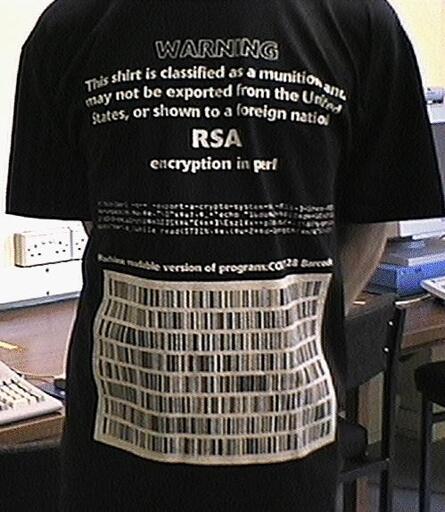The software was classed as munitions and one needed an arms dealer’s license to publish it, including online. The creator of PGP published the full source code as a book, as these are covered under first amendment rights.
Yes, that was indeed a very interesting story:
Zimmermann challenged these regulations in an imaginative way. In 1995, he published the entire source code of PGP in a hardback book, via MIT Press, which was distributed and sold widely. Anyone wishing to build their own copy of PGP could cut off the covers, separate the pages, and scan them using an OCR program (or conceivably enter it as a type-in program if OCR software was not available), creating a set of source code text files. One could then build the application using the freely available GNU Compiler Collection. PGP would thus be available anywhere in the world. The claimed principle was simple: export of munitions—guns, bombs, planes, and software—was (and remains) restricted; but the export of books is protected by the First Amendment. The question was never tested in court with respect to PGP. In cases addressing other encryption software, however, two federal appeals courts have established the rule that cryptographic software source code is speech protected by the First Amendment (the Ninth Circuit Court of Appeals in the Bernstein case and the Sixth Circuit Court of Appeals in the Junger case)…
(Source)
Yep, we called them crypto wars
Fun fact: They made encryption on Ham/GMRS radios illegal because they didn’t want the average citizenry to have access to secure off-grid comms without government spyware on networks that they control.
Reject Smarphones, Return to Amateur Radios. Just modify some radios, add a raspberry pi to do enccyption on the voice before it gets transmitted.
THEY CANT ARREST US ALL! (seriously tho, I haven’t heard of the FCC actually doing anything, unless you were jamming the airport radios or something crazy)
The primary reason is the FCC can’t tell if the encrypted transmissions are commercial or otherwise illegal. The amateur bands would be full of high frequency trading brokerages, drug traffickers, and spies.
… this sounds like a fun project for the high school electronics club
Encryption using IP over HAM is still illegal - you can’t access Lemmy because it’s an HTTPS site, because we live in the 21st century.
Also anyone with a civilian GPS couldn’t use it for precise measurement because they added a deliberate error into them. It also took twenty to thirty minutes to download a gif of Samantha Foxes tits. PGP was really popular then. There were version on every dial in BBS in the US. Without a doubt someone/anyone overseas that wanted it, had it. It was a joke of security theater and didn’t last.
It wasn’t an error, as such. They had just limited the resolution available for most people. It was called “Selected Availability”.
It was described at the time by every one including the government as a deliberate error. I knew it had a name attached to it but it is inconsequential. It caused the readings to jump around randomly making the resolution somewhere are fifty to seventy five feet. Bill the blowjob bubba clinton had it turned off during his administration.
The whole thing reads like this is weak encryption that doesn’t actually work and that is what they wanted people to have for that false sense of security. That’s wild
I don’t remember the details but I listened to a few podcasts on the topics and that what exactly how the hosts presented it
I had one of those t-shirts in the early 00s. Got it at a Goodwill and hung it on my wall for a while
deleted by creator
It’s shocking to me the major events of my life that have fallen into the memory hole. It’s not just that younger people haven’t learned about them, older people have just filtered them out. It’s like we live in an eternal now that stretches infinitely in both directions, until it abruptly changes and yet another new reality becomes our new past and future.
Yep I remember the scary text the came with certain software threatening superjail if you sent the exe overseas
Jail Pro.
As some from outside of the US, I also remember you had to pinky promise you are in the US to download the good version of Mozilla.
Not all heroes wear capes
An annoyance that came shortly after was that they were not allowed to ship the Java Runtime Environment / Development Kit with a javax.crypto library that allowed for algorithms stronger than DES (such as AES, Twofish, Blowfish, …), or long passwords, iirc.
There was some way to download something extra (Java Cryptography Extension (JCE) Unlimited Strength Jurisdiction Policy Files) and fiddle it in, but with regulation in the US, I think.
I was quite sad when I made one of my early programs based on that and it turned out to be useless to US citizens, and hard to use for everyone else. I think I made a bouncycastle-based version later, but it was basically a full rewrite.
Edit: I’m starting to remember more absurdities of the time: Even with the JCE, the best algorithm for symmetric encryption was 3DES, which was not a legal requirement, just laziness of Sun Microsystems. While it was somewhat safe, it was less than ideal and really slow.
Fun fact, Google pay and other “modern” payment processors still had to use 3DES until 2020 at least (might still do, I got out of the industry).










